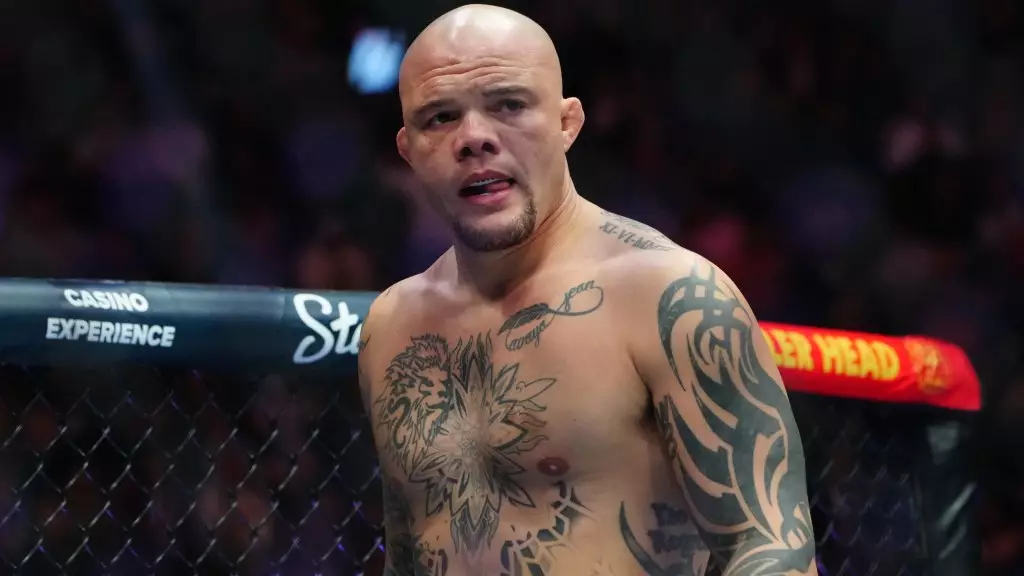In the high-stakes arena of mixed martial arts, the mental and emotional fortitude of a fighter is as crucial as their physical prowess. Anthony Smith, a seasoned veteran with a record of 38 wins and 21 losses, faced an uphill battle at UFC 310. Competing against Dominick Reyes in Las Vegas, he stepped into the octagon grappling with profound personal loss. The death of his longtime friend and coach, Scott Morton, weighed heavily on his heart, clouding his focus and resolve. In his walkout, Smith’s tears revealed the raw emotions brewing beneath his warrior exterior.
Many fighters are admired for their ability to compartmentalize personal struggles, but Smith’s openness about his state of mind candidly reflects the challenges facing athletes who balance both mental health and the demands of professional competition. As he later confessed, despite his reputation for resilience, this moment proved particularly difficult, unlike anything he had faced before. Smith’s honesty about his emotional struggle invites a deeper discussion about the underlying pressures fighters endure.
The bout itself was not indicative of the skilled fighter Smith has been known to be. Suffering a second-round TKO, Smith exhibited signs of frustration that were atypical for someone of his experience. In recounting the fight, he noted a moment where he inexplicably dropped his hands, almost inviting Reyes to hit him. This admission of impatience—“I just wanted something to f*cking happen”—highlights a striking vulnerability that contrasts sharply with the stoic image often associated with competitive athletes.
Was it possible that the overwhelming grief clouded his judgment, causing him to lose the tactical awareness and strategic thinking that had propelled him through his career? Watching his own performance unfold, he recalled feeling trapped in the moment and doubting his capabilities. “Maybe I’m not either anymore,” he later admitted. This deep-seated introspection, wherein Smith questioned not just his opponent’s abilities but his own, illustrates a critical juncture for any athlete encountering age, injury, or personal obstacles.
Post-fight, the reflections continued. Conversations surrounding retirement often arise in the wake of a challenging performance, and for Smith, this was no different. His fellow fighter and a close friend, Michael Bisping expressed hope for one more bout, envisioning a potential sendoff that better captures Smith’s legacy. The desire for a final fight underlined the ongoing narrative of sports as both a career and a life journey filled with relationships, sacrifices, and hard-won lessons.
Smith echoed this notion, suggesting that if the right circumstances presented themselves—timing, opponent, and situation—he might consider one last appearance in the octagon. He reflected on the possibility of celebrating his journey and thanking the supporters who have rallied behind him throughout the years. It’s a compelling notion: a farewell fight that transcends mere competition and transforms into a heartfelt experience celebrating a career.
Smith’s situation serves as a rallying point for the broader conversation about the mental health of athletes. The adrenaline-fueled world of professional fighting often masks emotional and psychological vulnerabilities. Yet, as Smith’s story illustrates, these pressures can manifest during pivotal moments in their careers, impacting performance and well-being.
By sharing his vulnerabilities, Smith becomes an important voice in the fight against the stigma surrounding mental health in sports. As athletes continue to be lauded for their physical abilities, it is equally vital to acknowledge the weight of their personal struggles and the emotional landscapes they traverse. An open dialogue around these issues can foster understanding and provide much-needed support for current fighters, making it clear that being a “fighter” encompasses more than competition—it includes the courage to confront one’s vulnerabilities head-on.
Ultimately, the journey of Anthony Smith becomes a poignant reminder of the resilience required not just in the octagon, but also in the heart and mind. Whether he steps back into the ring again or not, his story is an essential chapter in the narrative of what it means to be a fighter.

